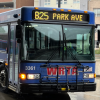A park guard blows his whistle to warn the gates will soon close at Parc Andre Citroen, which lies along the Seine River in the west of Paris. But before the park shuts for the night, a handful of people, including artist Florian Roblain, are gathered around the water fountain filling their containers.
"I'm filling up my bottles with sparkling water," says Roblain. "Sometimes people have 10 bottles. It's ecological and of course, cheap. When you come twice a week, if you've got children, you become used to it. it's a rhythm, it's part of your life."
That's right: a public fountain that serves up sparkling water. France might be known for its bottled water – take Evian from the Alps, or a bottle of bubbly Perrier. But in Paris, the mayor is pushing people to give up the bottles in favor of tap water from the city supply. One way the city is trying to do so is to make its water more appealing.
There are already several bubbly water fountains, but new ones are being added in every arrondissement.
I meet Celia Blauel, deputy mayor in charge of climate and water, at Paris' ornate city hall. Blauel says Paris already has more than a thousand public fountains, but the city wants to make some of them more exciting by providing carbonated water.
"It's the idea to make people think about water. The idea that it's important to protect water," she tells me. "And we want to push people to change their habits and just trust that water coming from a public tap is good-quality water. And that drinking it is like a political act – you're doing something for you, for your health, but also for the planet."
Blauel says since Napoleonic times, Paris' drinking water has been known for it's high quality. Half comes from underground wells and half from the Seine and Marne rivers. She says when a family of four switches from bottles to tap water, that's 12 fewer pounds of plastic waste a year.
A fontaine petillante, as a sparkling water fountain is known in French, has just been installed in the tiny Square Eugene Varlin near the Canal St. Martin in Paris' 10th arrondissement. It's so new, it hasn't even been turned on yet. A group of young men doing pull-ups on the parallel bars nearby say it's always good to have fresh water for their workouts. Twenty-two-year-old Clement Caire says he doesn't need any convincing not to buy bottled water.
"Tap water is better for the environment," he says. "There are too many bottles in the ocean and everywhere. It's too bad. Plus, I feel that Paris' tap water is protected and it's good. France in general has good tap water."
Back in Andre Citroen Parc, the setting rays of sun set the green grass aglow. Bernard Buffon says he used to buy bottled, fizzy water but now he just comes to the park.
"Its not a question of saving money," he says. "It's a question of having fresh air and walks in Paris. It's very nice."
Each sparkling water fountain has several faucets. The water is chilled to 44 degrees Fahrenheit before the carbon dioxide is added. Retiree Claude Lelorain, who is having a drink after his jog, says the quality of Paris' free public sparkling water is excellent.
"I think this is a remarkable initiative, but few Parisians know about it," says Lelorain. "But I do believe there are some restaurant owners who are serving this water to their customers."
Like many French people, 70-year-old Janine Kaluza alternates between different bottled waters to get all her minerals. She hasn't completely stopped buying bottled water, but says Paris' sparkling fountain water is now part of the mix.
"Some waters are good for your liver," she says, "and everyone knows sparkling water is good for your digestion."
Copyright 2017 NPR. To see more, visit http://www.npr.org/ .




